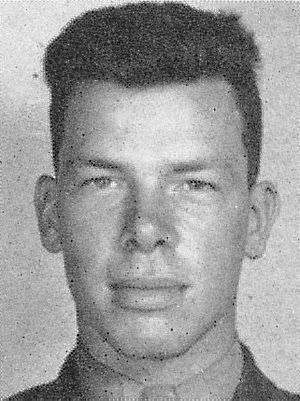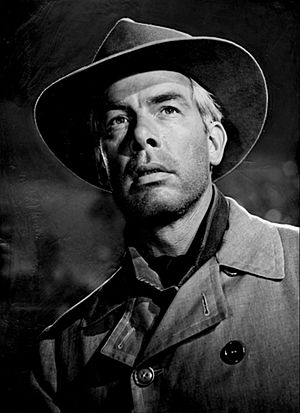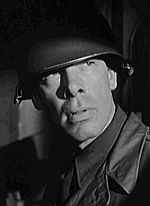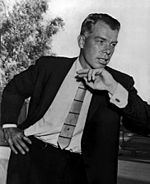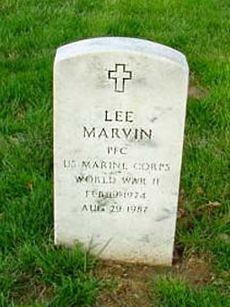Lee Marvin facts for kids
Quick facts for kids
Lee Marvin
|
|
|---|---|
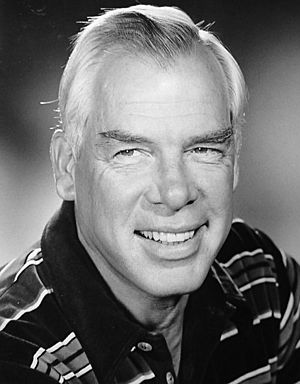
Marvin in 1971
|
|
| Born |
Lamont Waltman Marvin Jr.
February 19, 1924 New York City, U.S.
|
| Died | August 29, 1987 (aged 63) Tucson, Arizona, U.S.
|
| Resting place | Arlington National Cemetery |
| Education |
|
| Occupation | Actor |
| Years active | 1948–1986 |
| Political party | Democratic |
| Spouse(s) |
|
| Children | 4 |
| Military career | |
| Allegiance | |
| Service/ |
|
| Years of service | 1942–1944 |
| Rank | Private first class |
| Battles/wars | World War II
|
Lee Marvin (February 19, 1924 – August 29, 1987) was a famous American actor. He was known for his deep voice and early white hair. People often remember him for playing tough, strong characters. At first, he played villains, but later he became known for playing "anti-heroes," like Detective Lieutenant Frank Ballinger in the TV show M Squad (1957–1960).
Some of Lee Marvin's most famous movie roles include Charlie Strom in The Killers (1964), Major John Reisman in The Dirty Dozen (1967), and the Sergeant in The Big Red One (1980). He won many awards for his dual role as gunfighter Kid Shelleen and criminal Tim Strawn in the comedy Western film Cat Ballou (1965). This movie was a big surprise hit and earned him an Academy Award for Best Actor, a BAFTA Award, and a Golden Globe Award.
Contents
Growing Up
Lee Marvin was born in New York City. His father, Lamont Waltman Marvin, was a World War I veteran and an advertising executive. His mother, Courtenay Washington, was a fashion writer. Lee and his older brother, Robert, were named after American Civil War General Robert E. Lee.
When he was young, Lee Marvin played the violin. He also had dyslexia and ADHD. As a teenager, he loved to hunt deer, puma, and wild turkeys in the Everglades. He went to several schools, including Manumit School and Peekskill Military Academy. He was even expelled from some schools for misbehaving, like smoking and getting into fights, before attending St. Leo College Preparatory School.
Military Service
Serving in World War II
Lee Marvin joined the United States Marine Corps on August 12, 1942. He served in the 4th Marine Division as a scout sniper during World War II in the Pacific Theater. He fought in battles on islands like Eniwetok and Saipan-Tinian.
On June 18, 1944, during the Battle of Saipan, Lee was wounded by machine gun fire and then by a sniper. Most of his company were injured or killed in this battle. After more than a year of medical care in hospitals, Marvin was honorably discharged from the Marines as a Private First Class. He had been a corporal before but was demoted for causing trouble.
Lee Marvin received several medals for his service, including the Purple Heart Medal, the Presidential Unit Citation, and the World War II Victory Medal.
Medals and Awards
| Navy Commendation Medal with V Device |
| Asiatic-Pacific Campaign Medal |
Acting Career
Starting Out
After the war, Lee Marvin was working as a plumber's helper at a local theater. One day, an actor got sick, and Lee was asked to fill in. He loved acting so much that he decided to pursue it as a career. He moved to Greenwich Village in New York City and used his G.I. Bill benefits to study acting.
He started appearing in TV shows like Escape and The Big Story. In 1951, he made his debut on Broadway in a play called Billy Budd.
Moving to Hollywood
Marvin's first movie was You're in the Navy Now (1951). This film also featured other future stars like Charles Bronson. Since some filming was in Hollywood, Marvin decided to stay in California.
Because he was a decorated war veteran, Lee Marvin was naturally good at acting in war movies. He often helped directors and other actors make scenes look more realistic, especially with military movements and firearms. He appeared in many films, often playing tough guys or villains.
Some of his early movies include Diplomatic Courier (1952), The Duel at Silver Creek (1952), and Eight Iron Men (1952). He also guest-starred in many TV shows like Dragnet.
Famous Villain Roles
Marvin gained a lot of attention for playing villains in two important films: The Big Heat (1953), where he played a cruel boyfriend, and The Wild One (1953), where he starred opposite Marlon Brando. His gang in The Wild One was called "The Beetles."
He continued to appear in many films, including The Caine Mutiny (1954) and Bad Day at Black Rock (1955) with Spencer Tracy. In 1955, he played a complex bank robber in Violent Saturday. Critics praised his performance, saying he showed great promise for his future career.
He also had roles in Attack (1956) and Raintree County (1957) with Elizabeth Taylor.
M Squad and Leading Roles
Lee Marvin became a leading man in the TV series M Squad (1957–1960). He played Frank Ballinger, a tough Chicago police detective, in 100 episodes. The show was known for its action and Marvin's strong performance.
After M Squad, Marvin appeared in many other TV shows, including Wagon Train, Bonanza, and The Twilight Zone.
Big Movie Roles
Marvin returned to movies with a major role in The Comancheros (1961) with John Wayne. He worked with John Wayne again in two films directed by John Ford: The Man Who Shot Liberty Valance (1962) and Donovan's Reef (1963). In The Man Who Shot Liberty Valance, Marvin played the title character, Liberty Valance, and held his own against big stars like Wayne and James Stewart.
In 1964, Marvin starred in The Killers, where he played a professional assassin. This was the first film where he received top billing, meaning his name was listed first.
Becoming a Star
Marvin became a huge star with his funny role in the Western Cat Ballou (1965), co-starring Jane Fonda. This movie was a surprise hit, and Marvin won an Academy Award for Best Actor for his performance. He also won the Silver Bear for Best Actor at the Berlin Film Festival.
He then starred in the Western The Professionals (1966), playing the leader of a group of skilled mercenaries. After that, he was in the very successful World War II movie The Dirty Dozen (1967). In this film, he played a brave commander leading a group of soldiers on a dangerous mission. Marvin said his time in the Marine Corps helped him play the role of an officer realistically.
Following these successes, Marvin had a lot of control over his next film, Point Blank. In this influential movie, he played a criminal seeking revenge. He even helped choose the director, John Boorman, and was very involved in the film's story and production.
In 1969, Marvin starred in the musical Western Paint Your Wagon with Clint Eastwood. Even though he wasn't a professional singer, his song "Wand'rin' Star" became a hit!
Later Career
In the 1970s, Lee Marvin took on a wider variety of roles, playing fewer villains. His movies from this time include Monte Walsh (1970), Prime Cut (1972), and Emperor of the North (1973). He was even offered the role of Quint in the famous movie Jaws (1975), but he turned it down.
Marvin's last major role was in Samuel Fuller's war film The Big Red One (1980), which was based on Fuller's own war experiences. His final film appearance was in The Delta Force (1986) with Chuck Norris.
Personal Life
Lee Marvin was a member of the Democratic Party. He supported John F. Kennedy in the 1960 presidential election. Because of his experiences and injuries from the war, Lee became against war and spoke out against the Vietnam War.
Family
Lee Marvin married Betty Ebeling in 1952. They had four children: Christopher, Courtenay, Cynthia, and Claudia. They divorced in 1967. In 1970, he married Pamela Feeley. Pamela had four children from previous marriages, and they remained married until Lee's death.
Death
Lee Marvin had health problems later in his life. He passed away from a heart attack on August 29, 1987, at the age of 63. He was buried with full military honors at Arlington National Cemetery, a special place where many American heroes are laid to rest.
Filmography
Film
| Year | Title | Role | Notes |
|---|---|---|---|
| 1951 | You're in the Navy Now | Radio Man | Uncredited |
| Teresa | G.I. | Uncredited | |
| 1952 | Diplomatic Courier | MP at Trieste | Uncredited |
| We're Not Married! | "Pinky" | Uncredited | |
| The Duel at Silver Creek | Tinhorn Burgess | ||
| Hangman's Knot | Rolph Bainter | ||
| Eight Iron Men | Sgt. Joe Mooney | ||
| 1953 | Down Among the Sheltering Palms | Pvt. Snively | Uncredited |
| Seminole | Sgt. Magruder | ||
| The Glory Brigade | Cpl. Bowman | ||
| The Stranger Wore a Gun | Dan Kurth | ||
| The Big Heat | Vince Stone | ||
| Gun Fury | Blinky | ||
| The Wild One | Chino | ||
| 1954 | Gorilla at Large | Shaughnessy, Policeman | |
| The Caine Mutiny | "Meatball" | ||
| The Raid | Lt. Keating | ||
| 1955 | Bad Day at Black Rock | Hector David | |
| Violent Saturday | Dill, Bank Robber | ||
| Not as a Stranger | Brundage | ||
| A Life in the Balance | The Killer | ||
| Pete Kelly's Blues | Al Gannaway | ||
| I Died a Thousand Times | Babe Kossuck | ||
| Shack Out on 101 | Slob / Mr. Gregory | ||
| 1956 | Seven Men from Now | Bill Masters | Made by Batjac Productions, John Wayne's company. |
| Attack | Lt. Col. Clyde Bartlett | ||
| Pillars of the Sky | Sergeant Lloyd Carracart | ||
| The Rack | Capt. John R. Miller | ||
| 1957 | Raintree County | Orville "Flash" Perkins | Nominated—Laurel Award for Best Male Supporting Performance |
| 1958 | The Missouri Traveler | Tobias Brown | |
| 1961 | The Comancheros | Tully Crow | Nominated—Laurel Award for Best Male Supporting Performance |
| 1962 | The Man Who Shot Liberty Valance | Liberty Valance | Bronze Wrangler for Best Theatrical Motion Picture Nominated—Laurel Award for Best Action Performance |
| 1963 | Donovan's Reef | Thomas Aloysius "Boats" Gilhooley | |
| 1964 | The Killers | Charlie Strom | BAFTA Award for Best Actor in a Leading Role (also for Cat Ballou) Nominated—Laurel Award for Best Action Performance |
| 1965 | Cat Ballou | Kid Shelleen and Tim Strawn | Academy Award for Best Actor BAFTA Award for Best Actor in a Leading Role (also for The Killers) Golden Globe Award for Best Actor – Motion Picture Musical or Comedy Laurel Award for Best Male Comedy Performance National Board of Review Award for Best Actor (also for Ship of Fools) Silver Bear for Best Actor Nominated—New York Film Critics Circle Award for Best Actor |
| Ship of Fools | Bill Tenny | National Board of Review Award for Best Actor (also for Cat Ballou) | |
| 1966 | The Professionals | Henry "Rico" Fardan | Laurel Award for Best Action Performance |
| 1967 | The Dirty Dozen | Major John Reisman | Laurel Award for Best Action Performance |
| Point Blank | Walker | ||
| 1968 | Hell in the Pacific | American Pilot | |
| 1969 | Paint Your Wagon | Ben Rumson | Nominated—Golden Globe Award for Best Actor – Motion Picture Musical or Comedy |
| 1970 | Monte Walsh | Monte Walsh | Fotogramas de Plata Award for Best Foreign Performer Nominated—Laurel Award for Best Action Performance |
| 1972 | Pocket Money | Leonard | |
| Prime Cut | Nick Devlin | ||
| 1973 | Emperor of the North Pole | A No. 1 | |
| The Iceman Cometh | Hickey | ||
| 1974 | The Spikes Gang | Harry Spikes | |
| The Klansman | Sheriff Track Bascomb | ||
| 1976 | Shout at the Devil | Col. Flynn O'Flynn | |
| The Great Scout & Cathouse Thursday | Sam Longwood | ||
| 1979 | Avalanche Express | Col. Harry Wargrave | |
| 1980 | The Big Red One | The Sergeant | |
| 1981 | Death Hunt | Sergeant Edgar Millen | |
| 1983 | Gorky Park | Jack Osborne | |
| 1984 | Dog Day | Jimmy Cobb | French title: Canicule |
| 1986 | The Delta Force | Col. Nick Alexander | (final film role) |
Television
| Year | Title | Role | Notes |
|---|---|---|---|
| 1950 | Escape | Episode: "Whappernocker Song" | |
| The Big Story | Episode: "Eugene Travis, Memphis Tennessee Reporter" | ||
| Treasury Men in Action | Episode: "The Case of the Deadly Fish" | ||
| 1950–1953 | Suspense | Barrow | 2 episodes |
| 1952 | Rebound | Sgt. Krone / Bull | 2 episodes |
| Fireside Theatre | Episode: "Sound in the Night" | ||
| Biff Baker, U.S.A. | Michler / Captain Hollis | Episode: "Alpine Assignment" | |
| 1952–1953 | Dragnet | James Mitchell / Henry Ross | 2 episodes |
| 1953 | The Doctor | Episode: "The Runaways" | |
| The Revlon Mirror Theater | Red Johnson | Episode: "Lullaby" | |
| The Motorola Television Hour | Episode: "Outlaw's Reckoning" | ||
| Plymouth Playhouse | Episode: "Outlaw's Reckoning" | ||
| 1954 | The Pepsi-Cola Playhouse | John Temple | 2 episodes |
| Center Stage | Zach Toombs | Episode: "The Day Before Atlanta" | |
| Medic | Larry Collins | Episode: "White Is the Color" | |
| 1954–1959 | Schlitz Playhouse of Stars | Jim Patterson / Russ Anderson | 3 episodes |
| 1954–1961 | General Electric Theater | Sid Benton / Clerk / Joe Kittridge / Dick Giles / Art Temple / Captain Morrissey | 7 episodes |
| 1955 | TV Reader's Digest | Charlie Faust | Episode: "How Charlie Faust Won a Pennant for the Giants" |
| Fireside Theatre | Jigger | Episode: "Little Guy" | |
| Studio One | Teale | Episode: "Shakedown Cruise" | |
| 1955–1958 | Climax! | Mannon Tate / 'Little Man' Brush / Charter Plane Pilot / Capt. Cavallero | 4 episodes |
| 1956 | Kraft Television Theatre | Milo Bogardus | Episode: "The Fool Killer" |
| Front Row Center | David Hawken | Episode: "Dinner Date" | |
| 1957 | Studio 57 | Episode: "You Take Ballistics" | |
| The United States Steel Hour | Episode: "Shadow of Evil" | ||
| 1957–1960 | M Squad | Detective Lt. Frank Ballinger / Lt. Frank Ballinger / Barney | 117 episodes |
| 1959 | Westinghouse Desilu Playhouse | Captain David Roberts | Episode: "Man in Orbit" |
| 1960 | NBC Sunday Showcase | Ira Hayes | Episode: "The American" |
| 1960–1961 | Wagon Train | Jud Benedict / Jose Morales | 2 episodes |
| 1961 | Route 66 | John Ryan / Woody Biggs | 2 episodes |
| The Barbara Stanwyck Show | Jud Hollister | Episode: "Confession" | |
| The Americans | Capt. Judd | Episode: "Reconnaissance" | |
| Checkmate | Lee Tabor | Episode: "Jungle Castle" | |
| Alcoa Premiere | Hughes | Episode: "People Need People" Nominated—Primetime Emmy Award for Outstanding Single Performance by an Actor in a Leading Role |
|
| The Investigators | "Nostradamus" (Walter Mimms) | Episode: "The Oracle" | |
| 1961–1962 | The Untouchables | Mike Brannon / Victor Rait / Howard Carson / Nick Acropolis | 3 episodes |
| 1961–1963 | The Twilight Zone | Sam "Steel" Kelly / Conny Miller | Episodes: "The Grave" and "Steel" |
| 1962 | Ben Casey | Gerry Bramson | Episode: "A Story to Be Softly Told" |
| Bonanza | Peter Kane | Episode: "The Crucible" | |
| The DuPont Show of the Week | Juan de Nuñez | Episode: "The Richest Man in Bogotá" | |
| The Virginian | Martin Kalig | Episode: "It Tolls for Thee" | |
| 1962–1964 | Dr. Kildare | Buddy Bishop / Dr. Paul Probeck | 2 episodes |
| 1963 | The Dick Powell Show | Finn / Dave Blassingame | 2 episodes |
| Combat! | Sgt. Turk | Episode: "The Bridge at Châlons" | |
| Kraft Suspense Theatre | Sgt. Paul Ryker | 2 episodes | |
| The Great Adventure | Misok Bedrozian | Episode: "Six Wagons to the Sea" | |
| 1963–1964 | Lawbreakers | Himself – Host / Narrator | 35 episodes |
| 1965 | Bob Hope Presents the Chrysler Theatre | Nick Karajanian | Episode: "The Loving Cup" |
| 1968 | Sergeant Ryker | Sgt. Paul Ryker | Kraft Suspense Theatre |
| 1985 | The Dirty Dozen: Next Mission | Maj. John Reisman | Television film |
See also
 In Spanish: Lee Marvin para niños
In Spanish: Lee Marvin para niños
- The Sons of Lee Marvin, a fun, unofficial club dedicated to Lee Marvin
- Welcome to Night Vale, a podcast that includes Lee Marvin in its stories.
 | DeHart Hubbard |
 | Wilma Rudolph |
 | Jesse Owens |
 | Jackie Joyner-Kersee |
 | Major Taylor |


